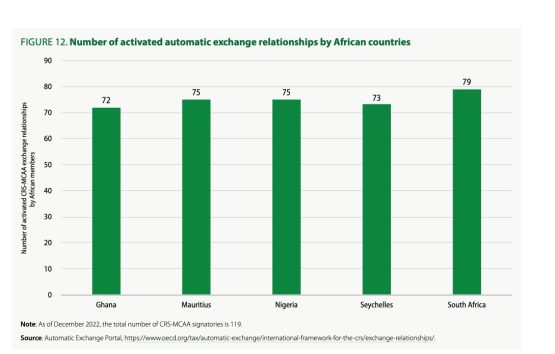Tax evasion and illicit financial flows due to base erosion and profit shifting have been a bugbear of African countries for years. Efforts to estimate the total amount of illicit flows have varied due to their secret nature.
However, a 2020 United Nations Conference on Trade and Development estimate puts it at €85.1 billion (R1.7 trillion) or around 3.7% of Africa’s gross domestic product.
In recent years, several African countries have enhanced their tax transparency and ability to exchange information to tackle these illicit capital flows. The latest Africa Initiative Progress Report shows five countries identified €76 million (R1.6 billion) in additional taxes through requests to exchange information with other jurisdictions in 2022 alone.
These figures bring the total revenues identified by African countries because of information exchanges, other offshore tax investigations, automatic sale of information-related voluntary disclosure programmes and the use of data to at least €1.69 billion (R34.38 billion) since 2009.
Read: Anti-money laundering task force reports successes
The Tax Transparency in Africa Report (TTiA 2023) released today (Thursday, 6 July) in South Africa includes information from 38 African countries. It is a joint publication by the African Union Commission, the African Tax Administration Forum and the Global Forum on Transparency and Exchange of Information for Tax Purposes (Global Forum).
Progress, yes, but …
Despite the progress, only a few countries are implementing the tax transparency standards, such as the exchange of information on request and the bar on the automatic exchange of financial account information under the common reporting standard.
These standards aim to enhance transparency by disclosing legal and beneficial ownership information and banking information.
Countries on the continent have relatively low exchange of information relationships – less than 700 – compared to the 2 410 relationships with jurisdictions outside of Africa.
According to the report, the low number of information exchange relationships between African jurisdictions may have negative implications for the implementation of the Africa Free Continental Trade Agreement (AfCFTA).
The agreement came into force in 2019 and aims to create the world’s largest free trade area bringing together all African countries and the eight regional economic communities.
Listen: How the African Continental Free Trade Agreement will impact business
Although the agreement may increase trade, it could also create intra-Africa cross-border tax evasion opportunities. Hence the need for a proper exchange of information infrastructure on the continent since it safeguards against tax evasion.
The report further states that African countries are still far from unpacking the full benefits of the automatic exchange of information (AEOI) standard. Only a limited number of countries are exchanging information automatically under the common reporting standard with other jurisdictions.

“During 2023, more African countries will thus be encouraged to consider participating in AEOI. The Africa Initiative will continue raising awareness on the potential of AEOI, building knowledge and providing technical support to help interested African countries to put in place the building blocks essential for AEOI,” the report says.
Matching rates
According to the report, countries that receive information through the common reporting standard must match it to their taxpayers’ declarations in their tax returns.
“Matching rates can therefore serve as an indicator of the quality of the information received. The higher the matching rates, the more information could be used to detect possible non-compliance with taxpayers’ tax obligations.”
The common reporting standard’s data matching rate has significantly improved over the years, reaching 70% worldwide in 2021.
The report notes that matching the information received from another jurisdiction to domestic taxpayer details is fundamental to fully realise the benefits of the automatic exchange of information standard.
This will enable tax authorities to make specific follow-up requests under the exchange of information standard to test compliance.
“The AEOI standard has a powerful deterrent effect, as residents of a country know that information on their financial assets and income in other jurisdictions will be collected and shared, on an automatic basis, with the tax administration of their country of residence,” the report notes.

